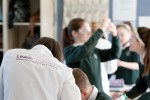Can you say what you do using only the ten hundred most common words in English? A
blog inspired by the
XKCD 'Up-Goer Five' image asks research scientists to do exactly that, using a
clever text editor to spot any unacceptably uncommon words.
Whilst not a research scientist, I thought I'd try to say what it is I do with Learn Chemistry, using the same limited vocabulary:
I help people who are learning about the little bits in everything and what they do; everything from hot part of a fire, to the always-warm rocks in the ground, to the water that we drink, and the glass on our phones.
These people can be old or young, good or bad at learning, but they all want to know more about those little bits - how they work, how to see them, how to make them, how to break them up, how to join them to other things, and so on.
I work with bright people who try to build a better place for these people to learn, share ideas and know more about the little bits of everything. This place is a kind of big room, and everyone, in any place, can look through their own window into the room, to find the things they need to help them.
Maybe, if we do our jobs well, people will want to know more about the little bits of everything after they leave little school, or leave big school, or even when they go to work; and everyone will know a little bit more about how the world works, and all the parts that make it up.
